It looks like you're using an Ad Blocker.
Please white-list or disable AboveTopSecret.com in your ad-blocking tool.
Thank you.
Some features of ATS will be disabled while you continue to use an ad-blocker.
share:
CornShucker
I was only going by what I've seen expressed by others as far as the Carcano. You are the first I've heard say anything good about it.
I'm going to take a guess and suggest that the only places you have read about the Carcano have been on JFK CT websites? Here is another source with info on the rifles; the good and the bad. www.surplusrifle.com...
CornShuckerThe one Oswald supposedly used was so out of whack that they eventually had to put three shims under the scope before it could be tested at the distance Oswald supposedly hit. The Warren Commission Report actually includes a picture of the three shims.
I have no doubt at all the scope mount was messed up. It could have been that way prior to shooting JFK or damaged by Oswald or someone else after the shooting. The side mounted scope did not block the sights, Oswald could have used the sights instead of the scope.
CornShuckerSounds like you know more about Fetzer than me. For now, I'll keep your opinion of him in mind. I never turn down the chance to be educated on this subject.
Fetzer is a grade A scumbag. It is a very good idea to learn more about your sources prior to using them to support your point of view.
CornShuckerHope you have a fantastic 2014.
Hope you do to.
Ranb
Well, I guess we've discussed HOW he was killed... I wrote a piece to honor the man. I hope you all enjoy it.
A Man to Remember:
It has been fifty years since there has been a successful attempt on the life of the President of the United States of America. Since a charismatic young leader was cut down in the prime of his life, with little explanation as to why. That man’s name was John Fitzgerald Kennedy, almost an embodiment of the American dream to the public, and when he died, it seemed perhaps the dream died with him. From the outside looking in, he was an example of how every man in America ought to be.
But from the inside, Kennedy was only human. He was a war hero, a president, and an icon, but he wasn’t immortal. To the public, he may have been King Arthur, but in private life, he concealed secret troubles, old injuries that left him in stoic agony. His injuries were a badge of honor. He served his country, during the Second World War. Every day in that dark time, he risked his life on a PT boat, fighting in the South Pacific.
But one night, the worst case scenario occurred. Kennedy’s patrol boat was under attack by a Japanese destroyer, the Amagiri. It was a situation straight out of David and Goliath. Kennedy’s fifty ton patrol boat stood little chance against the almost two thousand ton Amagiri. The Amagiri smashed into the PT, dealing a savage blow. The PT boat was irreparably damaged, several of the crew knocked into the water. They were out of the frying pan and into the fire. But this man who would be President wasn’t ready to give up.
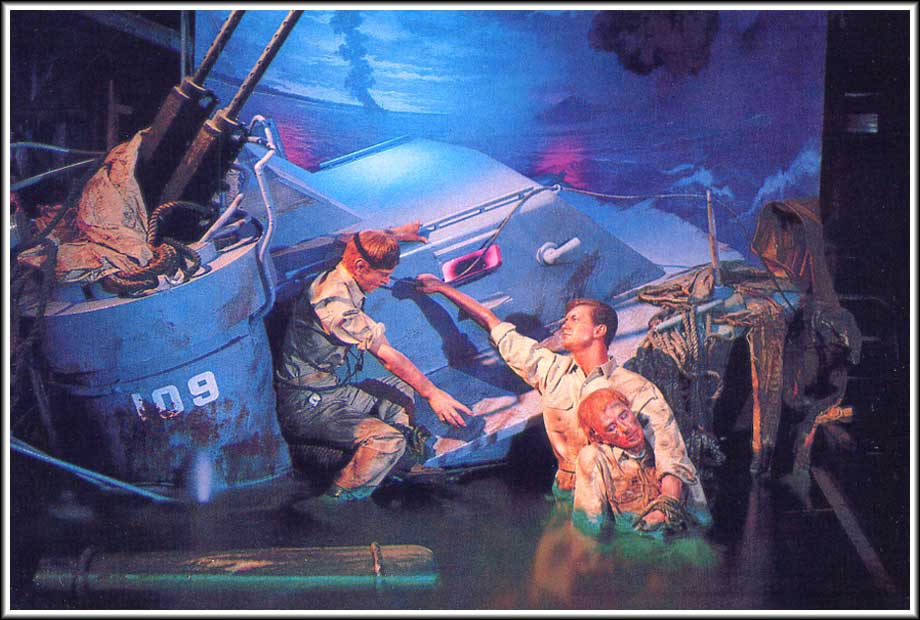
Kennedy rallied his men, and rescued those who had been cast into the sea . After the PT sunk, and a long and arduous swim, he would lead his men to safety. It was this event in his life that changed him, from an Ivy League fortunate son, to a leader of men. His actions rose above and beyond that of normal duty. Standing before the American people stood not a just the trust-fund recipient and the son of a millionaire, but instead a man of character and bravery.
It was this man who was elected to Congress in 1947. He was a champion and a defender of the American way. He had already proved his mettle, so with fire flowing through his veins, and passion in his voice, he started down the road to the Presidency. Running against typical bloated politicians, they stood no chance. A big fish in a small pond, by 1952, Kennedy had set his eyes on the Senate.
This time, it wouldn’t be so easy though. The man he ran against was an incumbent, from the very influential Lodge family. But the Kennedy name held weight in political circles as well, and this ambitious young congressman was no one to underestimate. Running against Henry Cabot Lodge II, with the influence and financial backing of the Kennedy family, John would prove himself a more-than-competent contender. His natural good looks and charisma did more for his popularity than any amount of money. Lodge made a poor contrast against the vitalized, youthful man that would defeat him. The election came close, though. The vote went to Kennedy, but just barely. With just 51 percent of the vote, he was officially a senator.
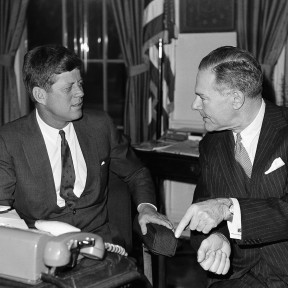
Now a rising star, Kennedy had no intentions of stopping there, or slowing down. By 1952, he had met the woman he would spend the rest of his life with. Beautiful, cultured, and intelligent, Jacqueline Bouvier fascinated Kennedy. Wasting no time, one year later, he married her. With a single sentence, a response to the priest that she did in fact take this man to be her lawfully wedded husband, Jacqueline Bouvier became Jackie Kennedy, the future first lady.
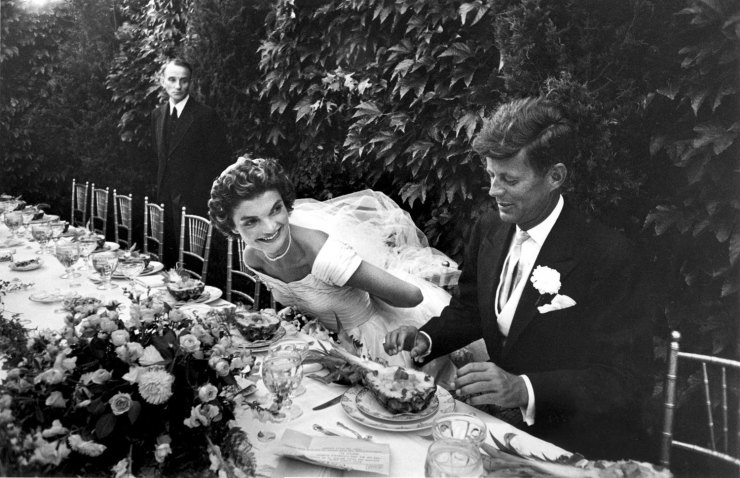
A Man to Remember:
It has been fifty years since there has been a successful attempt on the life of the President of the United States of America. Since a charismatic young leader was cut down in the prime of his life, with little explanation as to why. That man’s name was John Fitzgerald Kennedy, almost an embodiment of the American dream to the public, and when he died, it seemed perhaps the dream died with him. From the outside looking in, he was an example of how every man in America ought to be.
But from the inside, Kennedy was only human. He was a war hero, a president, and an icon, but he wasn’t immortal. To the public, he may have been King Arthur, but in private life, he concealed secret troubles, old injuries that left him in stoic agony. His injuries were a badge of honor. He served his country, during the Second World War. Every day in that dark time, he risked his life on a PT boat, fighting in the South Pacific.
But one night, the worst case scenario occurred. Kennedy’s patrol boat was under attack by a Japanese destroyer, the Amagiri. It was a situation straight out of David and Goliath. Kennedy’s fifty ton patrol boat stood little chance against the almost two thousand ton Amagiri. The Amagiri smashed into the PT, dealing a savage blow. The PT boat was irreparably damaged, several of the crew knocked into the water. They were out of the frying pan and into the fire. But this man who would be President wasn’t ready to give up.

Kennedy rallied his men, and rescued those who had been cast into the sea . After the PT sunk, and a long and arduous swim, he would lead his men to safety. It was this event in his life that changed him, from an Ivy League fortunate son, to a leader of men. His actions rose above and beyond that of normal duty. Standing before the American people stood not a just the trust-fund recipient and the son of a millionaire, but instead a man of character and bravery.
It was this man who was elected to Congress in 1947. He was a champion and a defender of the American way. He had already proved his mettle, so with fire flowing through his veins, and passion in his voice, he started down the road to the Presidency. Running against typical bloated politicians, they stood no chance. A big fish in a small pond, by 1952, Kennedy had set his eyes on the Senate.
This time, it wouldn’t be so easy though. The man he ran against was an incumbent, from the very influential Lodge family. But the Kennedy name held weight in political circles as well, and this ambitious young congressman was no one to underestimate. Running against Henry Cabot Lodge II, with the influence and financial backing of the Kennedy family, John would prove himself a more-than-competent contender. His natural good looks and charisma did more for his popularity than any amount of money. Lodge made a poor contrast against the vitalized, youthful man that would defeat him. The election came close, though. The vote went to Kennedy, but just barely. With just 51 percent of the vote, he was officially a senator.

Now a rising star, Kennedy had no intentions of stopping there, or slowing down. By 1952, he had met the woman he would spend the rest of his life with. Beautiful, cultured, and intelligent, Jacqueline Bouvier fascinated Kennedy. Wasting no time, one year later, he married her. With a single sentence, a response to the priest that she did in fact take this man to be her lawfully wedded husband, Jacqueline Bouvier became Jackie Kennedy, the future first lady.

reply to post by Grifter42
Kennedy seemed to have it all. By 1957, he had a child on the way and plans for something greater than even being a senator. He had decided that 1958 would be his last term running for senate.
In 1960, he ran for the office of the president of the United States of America, the highest position in the land. Running against him stood Richard Milhaus Nixon, a master manipulator and politician. Nixon was cunning, the kind of man that would take being called Machiavellian as a complement, and in the environment he existed in, such tendencies served him well.
There was a game changer on the horizon though. Television, the wave of the future, had come on the scene. Along with the advent of television came televised debates, and this is where Kennedy found an advantage. Kennedy was a statuesque handsome man with an honest face. Nixon had a countenance that was vaguely unpleasant, without confidence, or scruples. Standing side by side on live television, Nixon looked out matched.
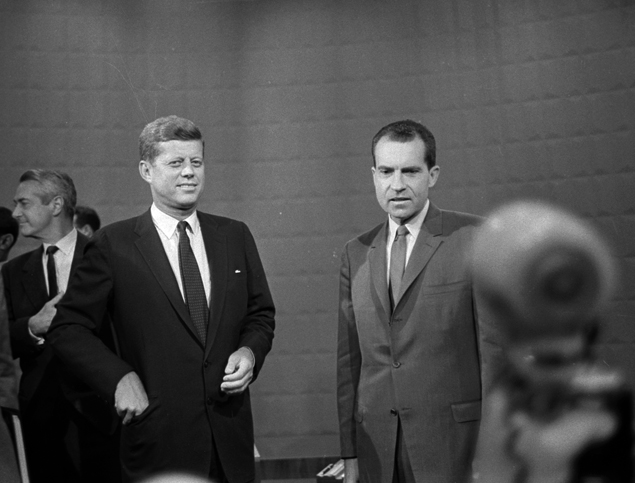
Still, Nixon was a cagey sort. With Kennedy’s old defeated adversary, Henry Cabot Lodge II as his running mate, they nearly fought Kennedy to a draw. The public went to vote November 8th, 1960. Soon, the results were in. Kennedy had received 49.7 percent of the total vote. Nixon lost by a tenth of a percentage point. One day he would be president, but on November 9th, he was just another person who lost an election to Kennedy.
Kennedy, however, had achieved something monumental. He had been elected to the highest office in the country, the most powerful man in the world. He was the youngest man to have ever become President. But his youth did not equal inexperience. He faced his problems with careful consideration, innovation, and wisdom.
He truly believed in equality. When in 1962, an intrepid African American named James Meredith was prevented from entering the University of Mississippi by a group of bigots, Kennedy sent 3,000 troops to the campus. With an entire army behind him, James Meredith went to that school, and got his education. When Governor George Wallace blocked the doorway to a school in 1963, because the people who wanted to enter were the wrong skin color, Kennedy sent the National Guard, and gave an address about the need for equality the same night. He started the path towards setting it in stone, laws that would prevent discrimination.
Kennedy was that sort of person. He was a man with genuine desire to do something for the people. To leave a mark on history. Progress was part of Kennedy’s appeal. When he said something, he meant it. He was a very rare thing to behold, an honest politician. But everything good comes to an end eventually.
The date of November the 22nd, 1963, will live on in infamy. On that day, this great king of men fell. In front of a crowd of cheering people, his wife, and other officials, he was shot. The nation went into shock. Clouds blotted out the light of hope, and a country in mourning collectively wept an ocean of tears. The President was dead. Camelot was no more. One minute, John sat up, his usual self, waving to the crowd, and then in an instant, he was gone, his mind annihilated by senseless violence.
John F. Kennedy is still with us even today though. The shot that killed his body made his ideals live on forever. The Eternal Flame burns in honor of him, and as a reminder of Jack and what he stood for. One of the last truly great and progressive presidents rests in peace, having accomplished more in three years than most politicians do in their entire career.
Jack once said, “We choose to go to the Moon in this decade and do the other things, not because they are easy, but because they are hard”. That’s who John F. Kennedy was. Someone who took on a challenge, set a deadline, and meant it. While he wouldn’t live to see it, in 1969, Apollo 11 did it. Man walked on the moon. Even in death, he kept his word. Here’s to you, John
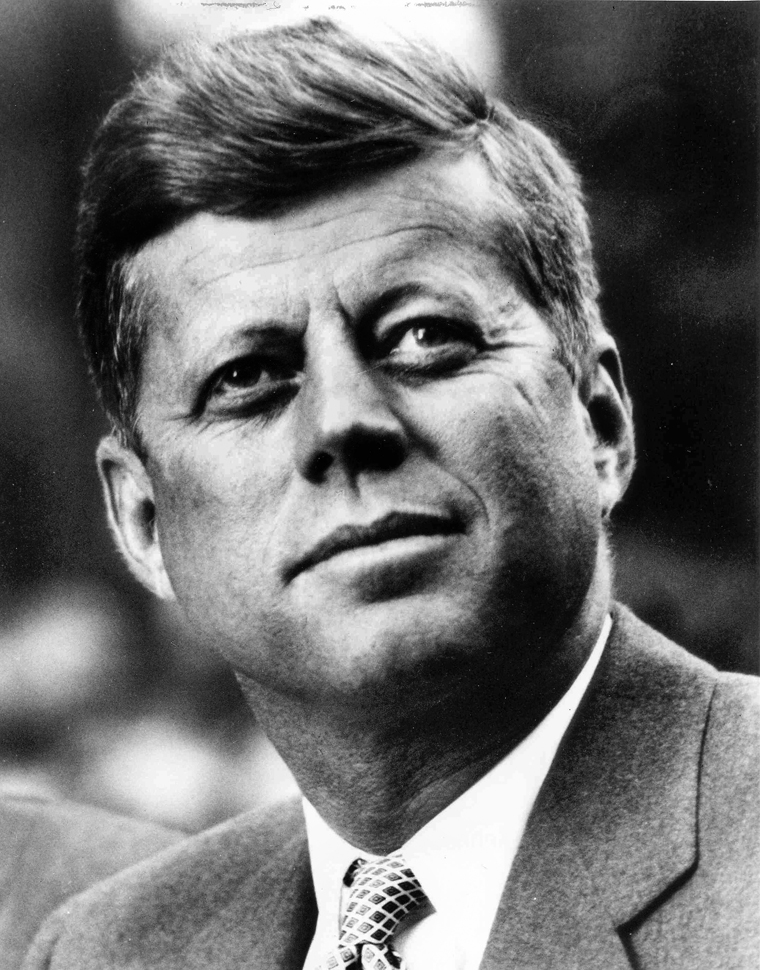
Kennedy seemed to have it all. By 1957, he had a child on the way and plans for something greater than even being a senator. He had decided that 1958 would be his last term running for senate.
In 1960, he ran for the office of the president of the United States of America, the highest position in the land. Running against him stood Richard Milhaus Nixon, a master manipulator and politician. Nixon was cunning, the kind of man that would take being called Machiavellian as a complement, and in the environment he existed in, such tendencies served him well.
There was a game changer on the horizon though. Television, the wave of the future, had come on the scene. Along with the advent of television came televised debates, and this is where Kennedy found an advantage. Kennedy was a statuesque handsome man with an honest face. Nixon had a countenance that was vaguely unpleasant, without confidence, or scruples. Standing side by side on live television, Nixon looked out matched.

Still, Nixon was a cagey sort. With Kennedy’s old defeated adversary, Henry Cabot Lodge II as his running mate, they nearly fought Kennedy to a draw. The public went to vote November 8th, 1960. Soon, the results were in. Kennedy had received 49.7 percent of the total vote. Nixon lost by a tenth of a percentage point. One day he would be president, but on November 9th, he was just another person who lost an election to Kennedy.
Kennedy, however, had achieved something monumental. He had been elected to the highest office in the country, the most powerful man in the world. He was the youngest man to have ever become President. But his youth did not equal inexperience. He faced his problems with careful consideration, innovation, and wisdom.
He truly believed in equality. When in 1962, an intrepid African American named James Meredith was prevented from entering the University of Mississippi by a group of bigots, Kennedy sent 3,000 troops to the campus. With an entire army behind him, James Meredith went to that school, and got his education. When Governor George Wallace blocked the doorway to a school in 1963, because the people who wanted to enter were the wrong skin color, Kennedy sent the National Guard, and gave an address about the need for equality the same night. He started the path towards setting it in stone, laws that would prevent discrimination.
Kennedy was that sort of person. He was a man with genuine desire to do something for the people. To leave a mark on history. Progress was part of Kennedy’s appeal. When he said something, he meant it. He was a very rare thing to behold, an honest politician. But everything good comes to an end eventually.
The date of November the 22nd, 1963, will live on in infamy. On that day, this great king of men fell. In front of a crowd of cheering people, his wife, and other officials, he was shot. The nation went into shock. Clouds blotted out the light of hope, and a country in mourning collectively wept an ocean of tears. The President was dead. Camelot was no more. One minute, John sat up, his usual self, waving to the crowd, and then in an instant, he was gone, his mind annihilated by senseless violence.
John F. Kennedy is still with us even today though. The shot that killed his body made his ideals live on forever. The Eternal Flame burns in honor of him, and as a reminder of Jack and what he stood for. One of the last truly great and progressive presidents rests in peace, having accomplished more in three years than most politicians do in their entire career.
Jack once said, “We choose to go to the Moon in this decade and do the other things, not because they are easy, but because they are hard”. That’s who John F. Kennedy was. Someone who took on a challenge, set a deadline, and meant it. While he wouldn’t live to see it, in 1969, Apollo 11 did it. Man walked on the moon. Even in death, he kept his word. Here’s to you, John

TheComte
In my opinion, the people who perpetrated the actual assassination and set up the patsy was the Chicago Outfit with help from the CIA. It is a fact that at this time these two organizations were working together on Cuba, and there are too many connections between the players.
If I had to pick theories, I think what you're describing probably comes closest to the truth. I always have... Vincent Bugliosi wrote a powerful book making Oswald the killer and it sure blew some theories out of the water, but it didn't exclude others to anything like my satisfaction.
I think the mafia helped get Kennedy elected through 'ol Joe and his old time bootlegging connections, then Bobby Kennedy decided war on the Mafia just had to be. Well...the Mafia has never been known as real subtle people when it comes to betrayal....and they had worked with U.S. Intelligence for securing the docks in New York and New Jersey during World War II..so history is there for one to call the other.
It's pretty easy to see how that could have well come together. Oswald is still guilty for his part, he's just the small fish in a big bucket of them.
reply to post by Grifter42
Grifter, very nicely written summary on JFK! (but maybe just a little too heavy on the mythology.) Thanks for taking the time to write it up.
If getting JFK out of office was the ultimate goal before the 1964 elections, there were so many other easier options! The brutality of the murder "in broad daylight" and shortly after "high noon" tells us a great deal about the minds of the organizers, the methods of the perpetrators and the handlers of Lee Harvey Oswald.
Grifter, very nicely written summary on JFK! (but maybe just a little too heavy on the mythology.) Thanks for taking the time to write it up.
If getting JFK out of office was the ultimate goal before the 1964 elections, there were so many other easier options! The brutality of the murder "in broad daylight" and shortly after "high noon" tells us a great deal about the minds of the organizers, the methods of the perpetrators and the handlers of Lee Harvey Oswald.
SayonaraJupiter
If getting JFK out of office was the ultimate goal before the 1964 elections, there were so many other easier options! The brutality of the murder "in broad daylight" and shortly after "high noon" tells us a great deal about the minds of the organizers, the methods of the perpetrators and the handlers of Lee Harvey Oswald.
It was done the way it was done to send a message. I don't know who the message was to, but it was definitely a message.
It could have been to future presidents, it could have been to the Kennedy family. If this was just a political rivalry there were other ways to go about things with an election coming up. If it was meant to get someone elected in 1964 it was timed poorly as well.
The meeting between LBJ, Bush, Nixon, members of the mafia, and all the rest the night before it happened says it all to me. He was killed to prevent reform, and it was done at such a time that his successor in an election would have time to realize that it would be suicide to follow JFK's path. Honestly, George Carlin probably got it right when he said new presidents are shown a video depicting the Kennedy assassination from another angle.
new topics
-
The Cost of True Discipleship—Count the Cost
Religion, Faith, And Theology: 4 hours ago -
population madness
New World Order: 5 hours ago -
Mass UAP events. DC. Machester Airport, UFOs over sub base in CT, Nuke bases.
Aliens and UFOs: 6 hours ago -
Thanking a rosemary plant
General Chit Chat: 9 hours ago -
Unidentified Flying Objects Over U.S. Military Bases in Northeast UK, as of roughly 11 a.m. CST.
Aliens and UFOs: 10 hours ago
top topics
-
Unidentified Flying Objects Over U.S. Military Bases in Northeast UK, as of roughly 11 a.m. CST.
Aliens and UFOs: 10 hours ago, 9 flags -
Thanking a rosemary plant
General Chit Chat: 9 hours ago, 6 flags -
Mass UAP events. DC. Machester Airport, UFOs over sub base in CT, Nuke bases.
Aliens and UFOs: 6 hours ago, 6 flags -
Ben Habib has Left Reform UK
Regional Politics: 17 hours ago, 4 flags -
Holy Cow! Erm...Six Legged Turkey!!
World Sports: 14 hours ago, 2 flags -
population madness
New World Order: 5 hours ago, 2 flags -
The Cost of True Discipleship—Count the Cost
Religion, Faith, And Theology: 4 hours ago, 0 flags
